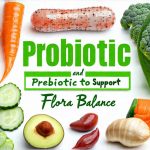The intricate ecosystem within our digestive system, commonly known as gut flora (or microbiome), profoundly influences far more than just digestion. It’s intimately linked to immunity, mental well-being, nutrient absorption, hormone regulation, and even chronic disease risk. A thriving gut microbiome is characterized by diversity – a wide range of bacterial species working in harmony. However, modern lifestyles often disrupt this delicate balance, leading to dysbiosis—an imbalance that can manifest in numerous ways, from bloating and fatigue to autoimmune conditions. Understanding the factors impacting gut health and proactively implementing strategies to nurture beneficial bacteria are crucial for overall well-being. This isn’t about eliminating bacteria; it’s about cultivating a resilient and balanced microbial community.
The challenge lies in recognizing that our guts aren’t static environments. They’re constantly responding to everything we ingest, experience, and encounter. Factors like diet, stress levels, sleep quality, antibiotic use, and environmental toxins all play a role in shaping the microbiome. Many conventional dietary patterns—high in processed foods, sugar, and lacking in fiber—actively contribute to dysbiosis by starving beneficial bacteria while promoting the growth of harmful ones. Re-establishing balance requires a multifaceted approach focusing on nourishing the good microbes, minimizing disruptions, and supporting the gut’s natural healing processes. It’s about building resilience into this vital internal ecosystem. Perhaps starting with daily rituals can help establish a foundation for gut health.
Dietary Foundations for Gut Health
A cornerstone of any gut health protocol is, unsurprisingly, diet. This isn’t about restrictive dieting; it’s about prioritizing foods that feed beneficial bacteria and minimizing those that harm them. Fiber is paramount – it acts as the primary food source for many good microbes in the colon. Aiming for a diverse range of plant-based foods ensures a broader spectrum of fiber types, supporting a more diverse microbiome. Foods rich in polyphenols—found abundantly in colorful fruits, vegetables, and spices—also possess prebiotic properties, further nourishing beneficial bacteria. Fermented foods, like yogurt (with live cultures), kefir, sauerkraut, kimchi, and kombucha, introduce probiotics – live microorganisms that can directly contribute to a healthier gut flora. However, it’s important to note that probiotic supplements aren’t always necessary or universally effective; dietary sources are often preferred for their broader nutritional context. Understanding gut acidity can also inform better food choices.
Beyond what we add to our diet, equally crucial is what we reduce or eliminate. Processed foods, refined sugars, and excessive amounts of saturated fats can disrupt the gut microbiome, promoting inflammation and potentially leading to dysbiosis. Artificial sweeteners have also been shown to negatively impact gut bacteria composition. Food sensitivities and intolerances – even mild ones – can also contribute to gut imbalance; identifying and addressing these through elimination diets or testing (under professional guidance) may be beneficial. Hydration is often overlooked, but adequate water intake supports optimal digestion and nutrient absorption, both crucial for a healthy gut environment. A well-planned eating schedule can make a significant difference.
The goal isn’t perfection, but progress. Small, sustainable changes in dietary habits can yield significant improvements over time. Focusing on whole, unprocessed foods, increasing fiber intake, incorporating fermented foods, and minimizing inflammatory triggers are all steps toward cultivating a healthier gut microbiome. It’s about building a long-term relationship with food that nourishes both body and bacteria.
Lifestyle Factors Impacting Gut Flora
Beyond diet, lifestyle choices exert a significant influence on the gut microbiome. Chronic stress is a major disruptor—it alters gut motility, reduces microbial diversity, and increases intestinal permeability (often referred to as “leaky gut”). Implementing stress management techniques like mindfulness meditation, yoga, deep breathing exercises, or spending time in nature can help mitigate these effects. Sleep quality is equally important; insufficient sleep disrupts the circadian rhythm, impacting gut function and potentially leading to dysbiosis. Aiming for 7-9 hours of quality sleep per night is crucial.
Regular physical activity has been shown to positively influence gut microbial composition. Exercise increases gut motility, reduces inflammation, and promotes a more diverse microbiome. It doesn’t need to be intense; even moderate exercise like walking or cycling can be beneficial. Finally, minimizing exposure to environmental toxins – such as pesticides, herbicides, and certain chemicals found in household cleaning products – is essential. These toxins can disrupt the gut microbiome and contribute to inflammation. Choosing organic foods when possible, using natural cleaning alternatives, and ensuring good ventilation are all steps toward reducing toxic load. Considering a weekly menu can help streamline healthy eating habits.
Supporting Gut Healing & Resilience
While nurturing beneficial bacteria is vital, sometimes the gut needs additional support to heal from damage or imbalances. Prebiotics – non-digestible fibers that feed beneficial bacteria – play a key role in this process. Sources include garlic, onions, leeks, asparagus, bananas, and oats. L-glutamine, an amino acid, is often used to help repair the gut lining, though supplementation should be discussed with a healthcare professional. Addressing any underlying digestive issues—such as heartburn, bloating, or constipation—is also crucial.
Consider incorporating bone broth into your diet; it contains collagen and gelatin which can aid in gut healing. However, be mindful of sourcing – choose organic, grass-fed options whenever possible. Another often overlooked aspect is chewing food thoroughly. This aids digestion, reduces the workload on the gut, and increases nutrient absorption. Focusing on meal composition can help minimize discomfort. Finally, listen to your body. Pay attention to how different foods affect you and adjust your diet accordingly. Gut health is a personalized journey, and what works for one person may not work for another. It’s about finding what supports your unique microbiome and overall well-being. Remember that consistency is key; building a daily protocol focused on these principles will yield the most significant long-term benefits. For example, optimizing breakfast can set a positive tone for your day.


















